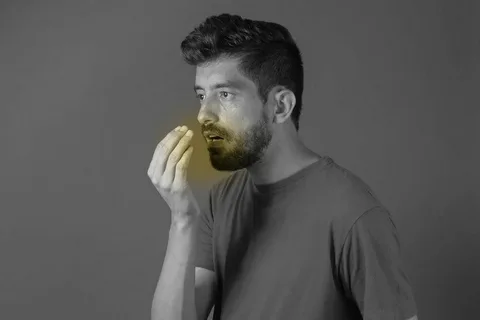Halitosis: Understanding Bad Breath and How to Treat It
Halitosis, commonly known as bad breath, is a condition characterized by an unpleasant odor emanating from the mouth. It can be a temporary issue or a persistent problem, affecting both social interactions and self-confidence. In most cases, halitosis is caused by the buildup of bacteria in the mouth, but it can also be a symptom of underlying health conditions. Fortunately, there are effective treatments and lifestyle changes that can help manage and eliminate bad breath.
Causes of Halitosis
Poor Oral Hygiene:
The most common cause of halitosis is the buildup of bacteria in the mouth. When food particles and bacteria linger on the teeth, tongue, and gums, they can produce sulfur compounds that create an unpleasant odor.Gum Disease (Periodontal Disease):
Gum disease, including gingivitis and periodontitis, causes bad breath due to the infection and inflammation of the gums. The bacteria responsible for gum disease also contribute to halitosis.Dry Mouth (Xerostomia):
A lack of saliva can result in dry mouth, which reduces the natural cleansing action of saliva. Saliva helps wash away food particles and bacteria. Without enough saliva, bad breath may occur.Food and Beverages:
Certain foods like garlic, onions, and spicy dishes can cause temporary bad breath due to their strong odor. Coffee and alcohol can also contribute to halitosis by drying out the mouth.Tobacco Use:
Smoking and chewing tobacco are major contributors to halitosis. In addition to leaving a bad odor, tobacco can also cause gum disease and dry mouth, further worsening bad breath.Underlying Medical Conditions:
Halitosis can sometimes be a sign of more serious health issues, such as:- Respiratory infections (like sinus infections or pneumonia)
- Diabetes
- Acid reflux or gastrointestinal issues
- Liver or kidney disease
- Certain medications
Mouth Infections or Dental Issues:
Tooth decay, oral infections, or poorly fitting dental appliances like dentures can harbor bacteria and cause persistent bad breath.
Symptoms of Halitosis
- Foul or Unpleasant Breath: The primary symptom of halitosis is persistent bad breath that doesn’t improve with regular brushing or mouthwash.
- Dry Mouth: A feeling of dryness in the mouth or a thick coating on the tongue, often associated with bad breath.
- Bad Taste in the Mouth: A persistent, unpleasant taste in the mouth may accompany halitosis.
- Other Signs: If halitosis is related to an underlying health condition, other symptoms like gum bleeding, sore throat, or frequent acid reflux may also be present.
Diagnosis of Halitosis
A dentist or healthcare professional can diagnose halitosis through a physical exam, and by asking questions about your medical history, oral hygiene habits, and lifestyle. To identify the underlying cause, further tests may be required, such as:
- Oral Examination: To check for gum disease, cavities, or infections.
- Saliva Testing: To evaluate moisture levels in the mouth.
- Medical Tests: If a systemic cause like diabetes or gastrointestinal reflux is suspected, additional medical tests may be ordered.
Treatment and Prevention of Halitosis
Maintain Good Oral Hygiene:
- Brush your teeth at least twice a day with fluoride toothpaste, and don’t forget to brush your tongue, where bacteria can accumulate.
- Floss daily to remove food particles and plaque from between your teeth.
- Use an antibacterial mouthwash to kill bacteria and freshen your breath.
Stay Hydrated:
Drink plenty of water throughout the day to prevent dry mouth and help wash away food particles and bacteria.Quit Smoking or Tobacco Use:
If you smoke or use tobacco products, quitting can significantly improve your breath and overall oral health.Treat Gum Disease:
If halitosis is caused by gum disease, seek treatment from your dentist. Scaling and root planing (deep cleaning) or other periodontal treatments may be required to eliminate infection.Regular Dental Visits:
Visit your dentist regularly for cleanings and checkups. Professional cleanings can help remove plaque buildup and identify any potential oral health issues contributing to bad breath.Use a Tongue Scraper:
Use a tongue scraper or brush your tongue to remove bacteria and debris that contribute to bad breath.Chew Sugar-Free Gum or Mints:
Chewing gum stimulates saliva production, which can help reduce dry mouth and neutralize bad breath.Treat Underlying Health Conditions:
If halitosis is caused by an underlying health issue, treating that condition will often improve your breath. This may include managing diabetes, treating gastrointestinal reflux, or addressing respiratory infections.Eat Breath-Friendly Foods:
Fresh fruits and vegetables like apples, carrots, and celery help clean teeth naturally and promote fresh breath. Parsley and mint are natural breath fresheners.
Key features about Halitosis

Persistent Bad Breath

Varied Causes

Potential for Social and Psychological Impact
Frequently asked questions
Here are descriptions for FAQs about Halitosiss to provide a clear understanding:
Halitosis is the medical term for chronic bad breath, which can result from various causes, including poor oral hygiene, gum disease, dry mouth, or other underlying health issues.
Common causes of halitosis include:
- Poor oral hygiene (bacteria build-up in the mouth)
- Gum disease (gingivitis or periodontitis)
- Dry mouth (reduced saliva production)
- Certain foods (garlic, onions, spicy foods)
- Tobacco use
- Underlying health conditions (diabetes, acid reflux, respiratory infections)
Yes, halitosis can be treated through proper oral hygiene, staying hydrated, quitting smoking, and addressing any underlying medical conditions. Treatment may also include dental cleanings, mouthwashes, or medications.
To prevent halitosis:
- Brush and floss your teeth regularly.
- Use a tongue scraper to remove bacteria from the tongue.
- Stay hydrated to avoid dry mouth.
- Visit the dentist regularly for cleanings and checkups.
- Avoid tobacco and limit foods that contribute to bad breath.
While halitosis is often caused by oral hygiene issues, persistent bad breath can sometimes signal an underlying health condition, such as gum disease, diabetes, or gastrointestinal reflux. It’s important to see a dentist or doctor if bad breath persists despite good oral care.

